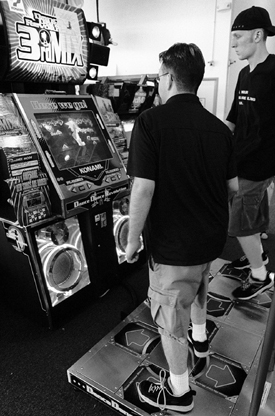|
Dance revolutionizes the way games are
played
by Jenee Osterheldt
Knight Ridder Newspapers
 |
| Players try to keep their feet moving on
the correct arrows while watching the dance
pattern on the screen. The arcade game being
played is Dance Dance Revolution, Aug. 17 in
Kansas City, Mo. AP Photo
Archive | |
KANSAS
CITY — Forget the fascination with the eye-dazzling graphics
of the Xbox and PlayStation 2.
Many sit-and-play video game addicts are getting up and
out, heading for the nearest arcade to jump on the interactive
rhythm game “Dance Dance Revolution.”
They have traded their tired fingers for crazy legs in an
eye-ear-foot coordination technology challenge.
The video game-dance union started in Japan a few years ago
and is turning America’s video gamers into a rhythm nation of
sorts.
The DDR craze has ignited the creation of clubs everywhere,
from California to a club in Kansas City known as DDRKC.
DDRKC is not a traditional club with meetings and officers
and minutes and dues. This organization is strictly for the
sport of rhythm games. At the meetings, gamers swap techniques
while playing the games.
Ryan Edwards, a 27-year-old software engineer, founded
DDRKC in April because he wanted to generate some interest in
the area.
Edwards even owns his own DDR arcade machines in Play
Central Station, an arcade in the suburb of Overland Park,
Kan. DDRKC helps encourage new players and provides a forum to
address local game issues, Edwards said.
“It generally adds to the following of such games in the
U.S. and worldwide,” he said. “Besides, it’s more fun to play
with friends than alone.”
DDR friends gather in groups as large as 20 every Thursday
at Play Central Station to take turns playing and
watching.
DDR is fun for the players, but to the spectator it looks
as serious as a boxing match. There are three levels based on
speed, beat and precision: basic, trick and maniac. Players
keep a straight face and barely move their arms — it is all
about precision with feet on arrows on beat for four songs
straight.
It is hyper-aerobic. By the fourth and final song in a
game, the dance maniac is wearing a sweat-soaked shirt. The
first move they make as they step off the machine is toward
the concession stand where they guzzle water so fast it gushes
out of their mouths and down their chins.
“It’s incredibly fun and a great workout,” T.J. Vehlewald,
17, said. “I am in better shape than I used to be and before I
started playing this. I sat around doing nothing.”
Bud Crittenden, a DDR maniac, and some of his co-workers at
Sprint in Kansas City, Kan., enjoy a game of DDR during lunch
breaks.
In addition to his lunch-hour fun, Crittenden said he comes
out on Thursday nights for a little fun exercise that is
cheaper than a membership at Bally’s.
“Since I’ve been doing it, I’ve been slowly losing weight,
and I’m toning up,” Crittenden, 33, who has been playing for
more than a year, said.
For others, the beat’s the thing.
“These games are fun because everybody likes music. It’s
not like using a controller — it’s about using your body,”
Duncan Oliver, a senior at Blue Valley Northwest in Overland
Park, Kan, said. “It’s pretty addictive. People who like it
should probably get the home version because once you start
you’ll end up using lots of tokens,” Oliver, 17, said.
Each player gets four songs for $1, but eventually this
adds up. Which is why many DDR fanatics have the home version
of the game on PlayStation ($30). Some play with their fingers
by controller, others buy the pad set ($50). A PC version is
available as well, and some dance fiends even have the actual
arcade version at home.
Jon Effertz, 15, got the actual arcade machine for his
birthday earlier this summer.
“My mom sees it as really good exercise and it’s so much
fun,” Effertz said. “My mom is actually getting good at it.
The whole family plays, and it’s good entertainment for
company.”
The next step for DDRKC freaks is competition.
“It seemed like you had to travel out farther west to get
some solid competition, so we decided to hold our own
tournaments here,” Vehlewald, a high school senior, said.
Tournaments are divided into technical and performance.
Performance competition is about freestyle dancing — technical
competition is based on precision.
“Competing in a tournament would be about seeing how I
rank,” Drew Miller, a 21-year-old DDR freak, said. “There’s a
challenge about it.”
“There really is no preparation for tournaments other than
practice,” Effertz said. “The hardest part of the game is
getting exactly on beat.”
All
material posted on Scroll eNews is property of
BYU-Idaho Scroll.
Contact mailto:scrollinternet@byui.eduwith comments or
problems. |